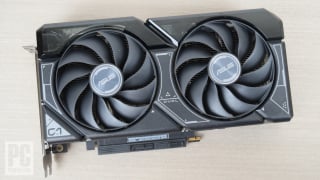
Check out our latest products
A reliable trend in PC tech over the past decade? Seeing more and more power squeezed into smaller and smaller packages. Nowadays, even the fastest and most potent graphics cards can work inside certain compact Mini-ITX PC cases (which, themselves, have expanded to accommodate), but you’ll need to mind power, thermal, and size limits. If you indeed need to find a small, peppy card to fit a tight PC case, that’s a tricky, multifaceted decision. At PCMag, we have decades of experience testing graphics cards, and we test all cards for frame rates across a rich selection of games, as well as for feature sets, designs, connections, and thermal traits. Let us help. Our current best pick for most buyers is the Intel Arc B580; no single option will work for everyone, though, so our list below has recommendations for all budgets. In addition to the picks, we’ve outlined all the considerations to remember as you shop. Read on.
Deeper Dive: Our Top Tested Picks
EDITORS’ NOTE
June 2, 2025: With this update, we added the Intel Arc B580 as our pick for Best Compact Mainstream Intel Graphics Card and the Arc B570 as Best Compact Budget Intel Graphics Card. We also added the Nvidia GeForce RTX 5070 as our new Best Semi-Compact Nvidia Graphics Card for 4K, and the AMD Radeon RX 9070 XT as our Best Semi-Compact AMD Graphics Card for 4K. We tested and evaluated eight new graphics cards for inclusion in this and our other graphics card roundups since our last update.
- Excellent ray-tracing performance for a lower-cost card
- Supports DLSS 3
- 8GB of video memory
- Competitive price
- Lackluster performance at higher resolutions
- Some issues running older games
Nvidia’s GeForce RTX 4060 (tested here in Asus livery) produces exceptional ray-tracing performance, thanks to its “Ada Lovelace” architecture. It’s the best modern, moderate-cost graphics card for 1080p gaming.
Graphics Processor
Nvidia AD107
GPU Base Clock
1830 MHz
GPU Boost Clock
2505 MHz
Graphics Memory Type
GDDR6
Graphics Memory Amount
8 GB
HDMI Outputs
1
DisplayPort Outputs
3
Number of Fans
2
Card Width
double
Card Length
9 inches
Board Power or TDP
115 watts
Power Connector(s)
1 8-pin
Learn More
Nvidia GeForce RTX 4060 Review

- Effective performance at 1080p resolution
- Competitively priced
- 8GB of GDDR6
- Compact design in reference board suggests compact partner-card designs are possible
- Poor performance above 1080p
- Lackluster showing in legacy games
AMD’s Radeon RX 7600 is an excellent graphics card for running modern games maxed out at 1080p—just stay at that resolution!—and 60fps.
Graphics Processor
AMD Navi 33
GPU Base Clock
2250 MHz
GPU Boost Clock
2625 MHz
Graphics Memory Type
GDDR6
Graphics Memory Amount
8 GB
HDMI Outputs
1
DisplayPort Outputs
3
Number of Fans
2
Card Width
double
Card Length
8 inches
Board Power or TDP
165 watts
Power Connector(s)
1 8-pin
Learn More
AMD Radeon RX 7600 Review

- Exceptional performance in its price tier
- 12GB GDDR6 memory
- 192-bit memory interface
- Potent ray-tracing performance
- Power consumption still a little high
- Bland aesthetics
- Lackluster performance with legacy games
A winner of a budget graphics card, Intel’s “Battlemage”-based Arc B580 delivers superb 1080p performance at its $249 price, with very good ray-tracing pep and enough bandwidth to game at even higher resolutions with the right settings.
Graphics Processor
Intel BMG-G21
GPU Boost Clock
2850 MHz
Graphics Memory Type
GDDR6
Graphics Memory Amount
12 GB
DVI Outputs
0
HDMI Outputs
1
DisplayPort Outputs
3
Number of Fans
2
Card Width
double
Card Length
10.7 inches
Board Power or TDP
190 watts
Power Connector(s)
1 8-pin
Learn More
Intel Arc B580 Review

- Compact, twin-fan design
- Full array of video ports in our test sample
- Good price-to-performance ratio for its segment
- Strong results in ray-tracing benchmarks
- High overclock ceiling
- Not as far ahead of AMD’s Radeon RX 6500 XT in some tests as we would have hoped
- Relatively high power consumption for its class
The GeForce RTX 3050 is a strong junior entry into Nvidia’s peerless lineup of “Ampere”-powered RTX 30 Series GPUs, and this EVGA XC Black card is a corker for 1080p play at a near-budget price.
Graphics Processor
Nvidia Ampere GA106
GPU Base Clock
1552 MHz
GPU Boost Clock
1777 MHz
Graphics Memory Type
GDDR6
Graphics Memory Amount
8 GB
HDMI Outputs
1
DisplayPort Outputs
3
Number of Fans
2
Card Width
double
Card Length
7.94 inches
Board Power or TDP
130 watts
Power Connector(s)
1 8-pin
Learn More
Nvidia GeForce RTX 3050 Review

- 1080p performance on par, in most games, with cards of similar list price
- Performance tier isn’t attractive to cryptocurrency miners
- RT cores unnecessary due to low performance
- Outrun by GTX 1650 Super on several tests
- Runs hot compared with similar cards
Gigabyte’s take on AMD’s Radeon RX 6500 XT budget GPU provides nearly rock-solid 1080p PC gaming performance in AAA and multiplayer titles, but it runs hot and packs unneeded ray-tracing cores.
Graphics Processor
AMD Navi 24
GPU Base Clock
1717 MHz
GPU Boost Clock
2815 MHz
Graphics Memory Type
GDDR6
Graphics Memory Amount
4 GB
HDMI Outputs
1
DisplayPort Outputs
1
Number of Fans
2
Card Width
double
Card Length
7.56 inches
Board Power or TDP
107 watts
Power Connector(s)
1 6-PIN
Learn More
AMD Radeon RX 6500 XT Review

- Potent ray-tracing performance
- Affordably priced
- Stays cool under load
- Slightly high power consumption
- Mixed performance outside of ray-tracing
Intel’s Arc B580 beats it on value, but the budget-minded Arc B570 (tested here as an ASRock Challenger card) delivers intense ray-tracing performance and competitive, if at times inconsistent, gaming speeds for the money.
Graphics Processor
Intel BMG-G21
Graphics Memory Type
GDDR6
Graphics Memory Amount
10 GB
HDMI Outputs
1
DisplayPort Outputs
3
Number of Fans
2
Card Width
double
Card Length
9.8 inches
Board Power or TDP
150 watts
Learn More
Intel Arc B570 Review

- Potent AI performance
- Competitive, though not triumphant, gaming speeds at its price point
- Increased power consumption over closest Nvidia predecessor (RTX 4070 Super)
- Generally slower than like-priced AMD competition
- Negligible performance gains over RTX 4070 Super
Nvidia’s midrange GeForce RTX 5070 graphics card produces only modest performance gains over its predecessor while consuming more power, just as AMD steps it up with a potent Radeon alternative.
Graphics Processor
Nvidia GB205
GPU Base Clock
2330 MHz
GPU Boost Clock
2512 MHz
Graphics Memory Type
GDDR7
Graphics Memory Amount
12 GB
HDMI Outputs
1
DisplayPort Outputs
3
Number of Fans
2
Card Width
double
Card Length
9.5 inches
Board Power or TDP
250 watts
Power Connector(s)
12VHPWR
Learn More
Nvidia GeForce RTX 5070 Review

- Highly competitive price
- Greatly improved ray-tracing performance versus previous generation
- Strong performance in many titles
- Stays cool under load
- AI performance in our LLM benchmark
- Non-ray-tracing performance lags behind last-gen Radeon GPUs
The Radeon RX 9070 XT, tested in Sapphire Pulse garb, shows greatly improved ray tracing performance over AMD’s last-gen GPUs. Its strong pricing (assuming it holds!) makes it a formidable competitor in the graphics card midmarket.
Graphics Processor
AMD Navi 48
GPU Base Clock
2400 MHz
GPU Boost Clock
2970 MHz
Graphics Memory Type
GDDR6
Graphics Memory Amount
16 GB
HDMI Outputs
2
DisplayPort Outputs
2
Number of Fans
3
Card Width
triple
Card Length
12.6 inches
Board Power or TDP
304 watts
Power Connector(s)
2 8-pin
Learn More
AMD Radeon RX 9070 XT Review

- Low-profile design
- No PCIe power needed
- Ray tracing support
AMD’s Radeon RX 6400 low-profile graphics card delivers a bump in performance over older GPUs and integrated graphics—though not a big one—with no need for extra power.
Graphics Processor
AMD Radeon RX 6400
GPU Base Clock
2039 MHz
GPU Boost Clock
2321 MHz
Graphics Memory Type
GDDR6
Graphics Memory Amount
4 GB
DVI Outputs
0
HDMI Outputs
1
DisplayPort Outputs
1
Number of Fans
1
Card Width
Half
Card Length
9.25 inches
Board Power or TDP
55 watts
Power Connector(s)
None
Learn More
AMD Radeon RX 6400 Review
Get Our Best Stories!

All the Latest Tech, Tested by Our Experts
By clicking Sign Me Up, you confirm you are 16+ and agree to our Terms of Use and Privacy Policy.
Thanks for signing up!
Your subscription has been confirmed. Keep an eye on your inbox!
The Best Graphics Cards for Compact PCs in 2025
Compare Specs
Buying Guide: The Best Graphics Cards for Compact PCs in 2025
Before determining which graphics card to buy for a compact PC, you should ideally already own a compact desktop or be close to buying one. This is a key starting place, as the size and design of your PC case will be one big determining factor in what graphics card you can use. In the PC case and motherboard markets, products are most often classified by form factor, with ATX, MicroATX, and Mini-ITX being the most common. It’s sufficient for the most part to think about these as big (ATX), medium (MicroATX), and small (Mini-ITX).

(Credit: Michael Justin Allen Sexton)
Being focused on compact PCs, most of this advice revolves around the Mini-ITX form factor. Most ATX and MicroATX cases will take just about any size graphics card. While it’s possible to get graphics cards that are too big for some ATX and MicroATX PC cases, this is far less common than with Mini-ITX cases. As this is the smallest common form factor, it’s no surprise that it has the most challenges with fitting in large components like graphics cards.

(Credit: Michael Justin Allen Sexton)
In truth, many late-model Mini-ITX PC cases can hold most graphics cards, even exceedingly powerful ones like Nvidia’s GeForce RTX 4080 and 5080. This is a relatively recent development, as Mini-ITX PC cases used to be smaller, but many companies now sell extended models designed to hold current graphics cards, which have been trending bigger in recent years. If you are buying one of these roomier models, you should have an easier time finding a graphics card for your PC.
The absolute smallest desktop PCs you can buy today, like the NUC-style models, rely on CPU-integrated graphics and don’t have room to add a graphics card of any size, so those are obviously non-starters. You’ll also find some Mini-ITX PCs that come between these two extremes and may be able to hold a graphics card…but with serious limitations. These PCs may only accept graphics cards that are half-height or that are relatively short in length.

(Credit: Michael Justin Allen Sexton)
Ultimately, before you can safely buy a graphics card for a compact PC, you will need to know just how much room that PC has to work with. Of particular note is the internal distance between the front and back of the case, the total number of add-on slots, and the maximum supported card height. You will then need to check these same features of any card you buy to ensure it can fit.
Can Your Power Supply Handle a New Video Card?
It’s also essential to check the power supply for your compact PC before you buy a graphics card. Compact PCs tend to be built with similarly compact power supplies, though this is not universal. Either way, power supplies are only able to support so much wattage, and this wattage measure tends to trend downward for compact PCs. Also, all but the very lowest-end modern graphics cards require additional power directly from the power supply and cannot get all the power they need directly from the system’s motherboard. This, naturally, requires the power supply to have the appropriate cables to deliver it, and if it doesn’t, then you should avoid buying a graphics card that needs them.

(Credit: Michael Justin Allen Sexton)
Typically, the best start is to gather your power supply unit’s information first. It will be marked with a specific wattage that indicates how much power it can handle. AMD, Intel, and Nvidia all place a recommended minimum PSU wattage on their graphics cards. If it’s the same or lower than the power supply’s shown wattage, you are likely good to go. If the wattage recommendation is higher than the PSU you have, you might still be able to use it, but this requires consideration on a case-by-case basis that we cannot properly advise on here. Unless you have experience in this area, stick to the recommended wattage numbers.

(Credit: Joseph Maldonado)
Next, look closely to ensure the PSU you have has the power connectors you need. The most common power connectors today are the 6-pin and 8-pin PCIe power leads that all but the lowest-end PSUs have. Again, you simply need to look at your power supply and the card you want to buy to make sure they have the same connections. If the PSU doesn’t have what you need, that’s where you should stop. It’s a strong sign that the PSU isn’t up to pushing the amount of power your graphics card will need.
One caveat to this rule regarding Nvidia: The GPU maker has a unique power connector for some of its graphics cards. Some newer GeForce RTX graphics cards ship with this new single standardized connection, called 12VHPWR. Nvidia typically supplies power adapters for these cards that can accept 6-pin and 8-pin PSU connectors, and they are safe to use so long as your PSU still meets the minimum power requirements for the card in question.

(Credit: Joseph Maldonado)
Though they are scarce today, some graphics cards are purpose-built to run solely off the power provided through a motherboard’s PCIe x16 slot. Nowadays, you see only the very lowest-end cards designed this way. They are easy to recognize, as they do not have any 6-pin or 8-pin power connections on their edge. These cards work in most systems, as their power draw is low, and they also tend to be quite small. As a result, if you are having trouble finding a card that’ll work with your system due to a weak PSU or really tight quarters, these could be the best options of last resort.
Ready to Buy the Right Compact Graphics Card for You?
Determining which graphics card to buy must be done on a case-by-case basis, which is why we suggest several options instead of a single option in this article. So long as you don’t run into any size or power restrictions, it’s often best to buy the most powerful graphics card that fits your budget.
With a compact PC, you may want to consider more energy-efficient cards over more powerful ones, as a hot-running card can be a problem in a tightly packed PC case without enough ventilation. However, you might end up trading off some performance in exchange for better efficiency. We include power and heat tests in all of our graphics card reviews to help you make this decision.
If you have a bit more room to play with in your PC case, check out our roundup of the best graphics cards for 4K gaming, which will be bigger cards. (Also check out our master guide to the best graphics cards overall, heedless of size.) Finally, complete your custom build with one of the top M.2 solid-state drives we’ve tested. These tiny SSDs are a perfect match if you’re space-strapped.

![[K-Beauty] Rose Vitamin Oil to Foam | Daily Face Wash Oil Based Cleanser | Korean Rose Oil Foaming Face Cleanser | Hydrating Facial Cleanser for Dry Sensitive Skin (3.88 oz)](https://i1.wp.com/m.media-amazon.com/images/I/71sX7yIuXRL._SL1500_.jpg?w=300&resize=300,300&ssl=1)





![[ 8 Pack ] Plastic Storage Baskets With Lids, Small Pantry Organization, Stackable Storage Bins, Household Organizers for Cabinets, Countertop, Drawers, Under Sink or On Shelves,Gray](https://i1.wp.com/m.media-amazon.com/images/I/81NMRFDwXYL._AC_SL1500_.jpg?w=300&resize=300,300&ssl=1)
![[Luxury] Kitchen Soap Dispenser Set – 16OZ Black Glass Bottle, Stainless Steel Pump, Instant Dry Tray, Waterproof Labels, Non-Slip Silicone Pad, and Dish Brush | Upgrade for Your Kitchen and Bathroom](https://i3.wp.com/m.media-amazon.com/images/I/71TQcJWiGtL._AC_SL1500_.jpg?w=300&resize=300,300&ssl=1)





